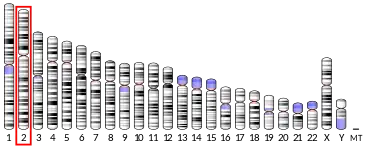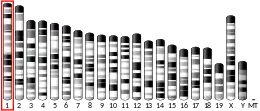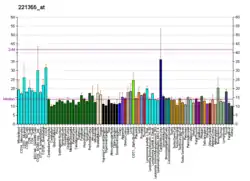CHRNG
Acetylcholine receptor subunit gamma is a protein that in humans is encoded by the CHRNG gene.[5]
For background information on the acetylcholine receptor (AChR), see CHRNA1 (MIM 100690). Two forms of AChR are found in mammalian skeletal muscle cells. The mature form is predominant in innervated adult muscle and the embryonic form is present in fetal and denervated muscle. Embryonic and mature AChR differ by the replacement of the gamma subunit in the pentameric glycoprotein complex by its isoform, the epsilon subunit (MIM 100725), which is specific to the mature AChR subtype. This switch is mediated by ARIA (acetylcholine receptor-inducing activity; MIM 142445).[supplied by OMIM][5]
References
- GRCh38: Ensembl release 89: ENSG00000196811 - Ensembl, May 2017
- GRCm38: Ensembl release 89: ENSMUSG00000026253 - Ensembl, May 2017
- "Human PubMed Reference:". National Center for Biotechnology Information, U.S. National Library of Medicine.
- "Mouse PubMed Reference:". National Center for Biotechnology Information, U.S. National Library of Medicine.
- "Entrez Gene: CHRNG cholinergic receptor, nicotinic, gamma".
External links
- Human CHRNG genome location and CHRNG gene details page in the UCSC Genome Browser.
Further reading
- Morgan NV, Brueton LA, Cox P, et al. (2006). "Mutations in the embryonal subunit of the acetylcholine receptor (CHRNG) cause lethal and Escobar variants of multiple pterygium syndrome". Am. J. Hum. Genet. 79 (2): 390–5. doi:10.1086/506256. PMC 1559492. PMID 16826531.
- Hoffmann K, Muller JS, Stricker S, et al. (2006). "Escobar syndrome is a prenatal myasthenia caused by disruption of the acetylcholine receptor fetal gamma subunit". Am. J. Hum. Genet. 79 (2): 303–12. doi:10.1086/506257. PMC 1559482. PMID 16826520.
- Gallego S, Llort A, Roma J, et al. (2007). "Detection of bone marrow micrometastasis and microcirculating disease in rhabdomyosarcoma by a real-time RT-PCR assay". J. Cancer Res. Clin. Oncol. 132 (6): 356–62. doi:10.1007/s00432-006-0083-y. PMID 16435141. S2CID 21561563.
- Hillier LW, Graves TA, Fulton RS, et al. (2005). "Generation and annotation of the DNA sequences of human chromosomes 2 and 4". Nature. 434 (7034): 724–31. doi:10.1038/nature03466. PMID 15815621.
- Ota T, Suzuki Y, Nishikawa T, et al. (2004). "Complete sequencing and characterization of 21,243 full-length human cDNAs". Nat. Genet. 36 (1): 40–5. doi:10.1038/ng1285. PMID 14702039.
- Strausberg RL, Feingold EA, Grouse LH, et al. (2003). "Generation and initial analysis of more than 15,000 full-length human and mouse cDNA sequences". Proc. Natl. Acad. Sci. U.S.A. 99 (26): 16899–903. doi:10.1073/pnas.242603899. PMC 139241. PMID 12477932.
- Vernet-der Garabedian B, Lacokova M, Eymard B, et al. (1994). "Association of neonatal myasthenia gravis with antibodies against the fetal acetylcholine receptor". J. Clin. Invest. 94 (2): 555–9. doi:10.1172/JCI117369. PMC 296130. PMID 8040310.
- Kreienkamp HJ, Maeda RK, Sine SM, Taylor P (1995). "Intersubunit contacts governing assembly of the mammalian nicotinic acetylcholine receptor". Neuron. 14 (3): 635–44. doi:10.1016/0896-6273(95)90320-8. PMID 7695910.
- Beeson D, Brydson M, Betty M, et al. (1993). "Primary structure of the human muscle acetylcholine receptor. cDNA cloning of the gamma and epsilon subunits". Eur. J. Biochem. 215 (2): 229–38. doi:10.1111/j.1432-1033.1993.tb18027.x. PMID 7688301.
- Shibahara S, Kubo T, Perski HJ, et al. (1985). "Cloning and sequence analysis of human genomic DNA encoding gamma subunit precursor of muscle acetylcholine receptor". Eur. J. Biochem. 146 (1): 15–22. doi:10.1111/j.1432-1033.1985.tb08614.x. PMID 3967651.
- Cohen-Haguenauer O, Barton PJ, Buonanno A, et al. (1990). "Localization of the acetylcholine receptor gamma subunit gene to human chromosome 2q32----qter". Cytogenet. Cell Genet. 52 (3–4): 124–7. doi:10.1159/000132860. PMID 2630182.
- Schurr E, Skamene E, Morgan K, et al. (1991). "Mapping of Col3a1 and Col6a3 to proximal murine chromosome 1 identifies conserved linkage of structural protein genes between murine chromosome 1 and human chromosome 2q". Genomics. 8 (3): 477–86. doi:10.1016/0888-7543(90)90034-R. PMID 1981051.
This article incorporates text from the United States National Library of Medicine, which is in the public domain.




